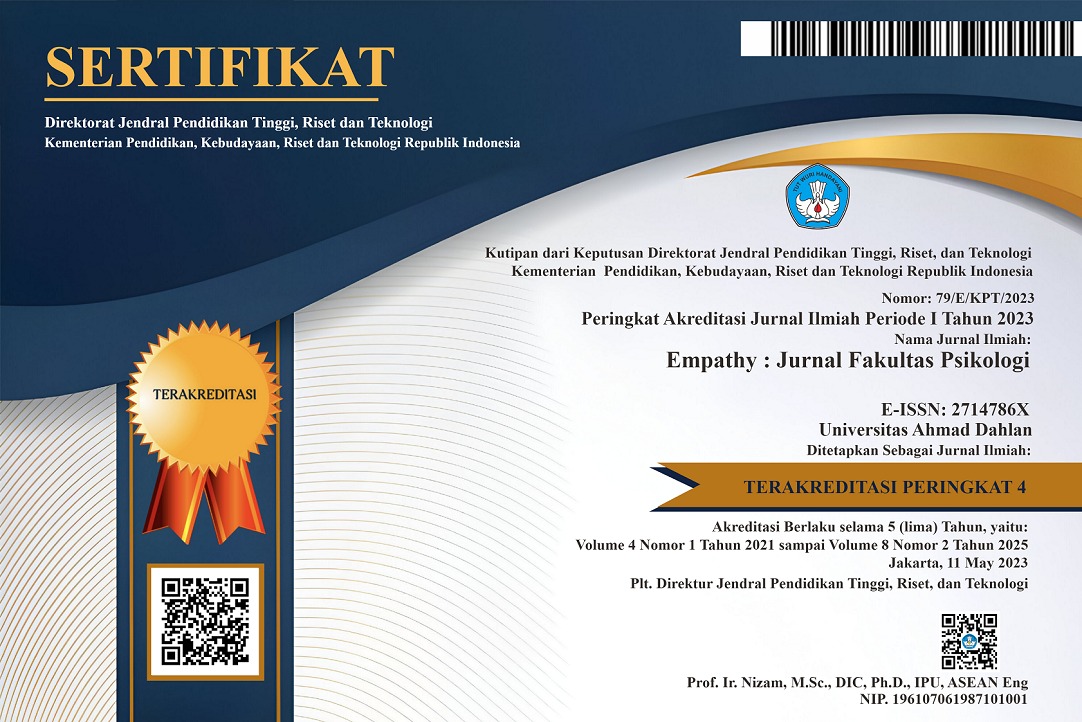The role of reciprocal actions of giving and receiving support on eudaimonic workplace well-being
Abstract
Keywords
Full Text:
PDFReferences
Future Workplace. (2021). Future workplace 2021 HR sentiment survey: Five strategic priorities for the hybrid workplace.
Kropp. B. (2021. April 26). 9 Work trends that HR leaders can’t ignore in 2021. Gartner.
International Labour Organization. (t.t.). Workplace well-being. Diambil 10 November 2021.
Bartels. A. L.. Peterson. S. J.. & Reina. C. S. (2019). Understanding well-being at work: Development and validation of the eudaimonic workplace well-being scale. PLOS ONE. 14(4). e0215957.
Turban. D. B.. & Yan. W. (2016). Relationship of eudaimonia and hedonia with work outcomes. Journal of Managerial Psychology. 31(6). 1006–1020.
Wang. X.. Li. A.. Liu. P.. & Rao. M. (2018). The relationship between psychological detachment and employee well-being: The mediating effect of self-discrepant time allocation at work. Frontiers in Psychology. 9.
Zhang. X.. Lin. Z.. Liu. Y.. Chen. X.. & Liu. D. M. (2020). How do human resource management practices affect employee well-being. A mediated moderation model. Employee Relations: The International Journal. 42(4). 903–919.
Arnold. J.. Randall. R.. Patterson. F.. Silvester. J.. Robertson. I.. Cooper. C.. Burnes. B.. Harris. D.. & Axtell. C. (2016). Work psychology: Understanding human behaviour in the workplace (6 ed.). Pearson Education.
Biggio. G.. & Cortese. ClaudioG. (2013). Well-being in the workplace through interaction between individual characteristics and organizational context. International Journal of Qualitative Studies on Health and Well-being. 8(1). 19823.
Sutton. A. (2021). Work psychology in action (2 ed.). Macmillan Education.
Mensah. A. (2021). Job stress and mental well-being among working men and women in Europe: The mediating role of social support. International Journal of Environmental Research and Public Health. 18(5). 2494.
Wepfer. A. G.. Allen. T. D.. Brauchli. R.. Jenny. G. J.. & Bauer. G. F. (2018). Work-life boundaries and well-being: Does work-to-life integration impair well-being through lack of recovery. Journal of Business and Psychology. 33(6). 727–740.
Taris. T. W.. & Schaufeli. W. B. (2014). Individual well-being and performance at work: A conceptual and theoretical overview. Dalam M. van Veldhoven & R. Peccei (Ed.). Well-being and Performance at Work (hlm. 15–34). Psychology Press.
Biswas. T.. Mäkelä. L.. & Andresen. M. (2022). Work and non-work-related antecedents of expatriates’ well-being: A meta-analysis. Human Resource Management Review. 32(3). 100889.
Curry. O. S.. Rowland. L. A.. Van Lissa. C. J.. Zlotowitz. S.. McAlaney. J.. & Whitehouse. H. (2018). Happy to help. A systematic review and meta-analysis of the effects of performing acts of kindness on the well-being of the actor. Journal of Experimental Social Psychology. 76. 320–329.
Titova. L.. & Sheldon. K. M. (2021). Happiness comes from trying to make others feel good. rather than oneself. The Journal of Positive Psychology. 17(1). 1–15.
Fisher. C. D. (2014). Conceptualizing and measuring wellbeing at work. Dalam P. Y. Chen & C. L. Cooper (Ed.). Work and wellbeing: Vol. III (hlm. 9–33). Wiley.
DOI: http://dx.doi.org/10.12928/empathy.v6i2.27360
Refbacks
- There are currently no refbacks.
Copyright (c) 2023 Sartika Ria Febrina & Alice Salendu

This work is licensed under a Creative Commons Attribution-ShareAlike 4.0 International License.
================================================================================================
ISSN 2303-114X (print) || 2714-786X (online)
Organized by the Faculty of Psychology
Published by Universitas Ahmad Dahlan, Yogyakarta
Website: http://journal.uad.ac.id/index.php/EMPATHY
email: empathy.jfp@psy.uad.ac.id
Lisensi Creative Commons Atribusi-BerbagiSerupa 4.0 Internasional




